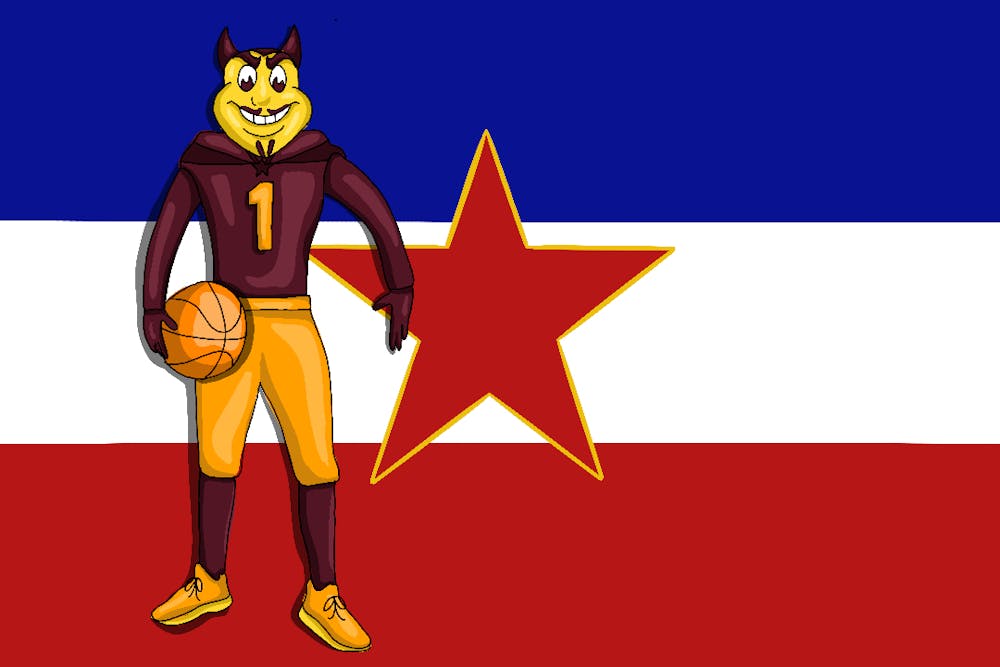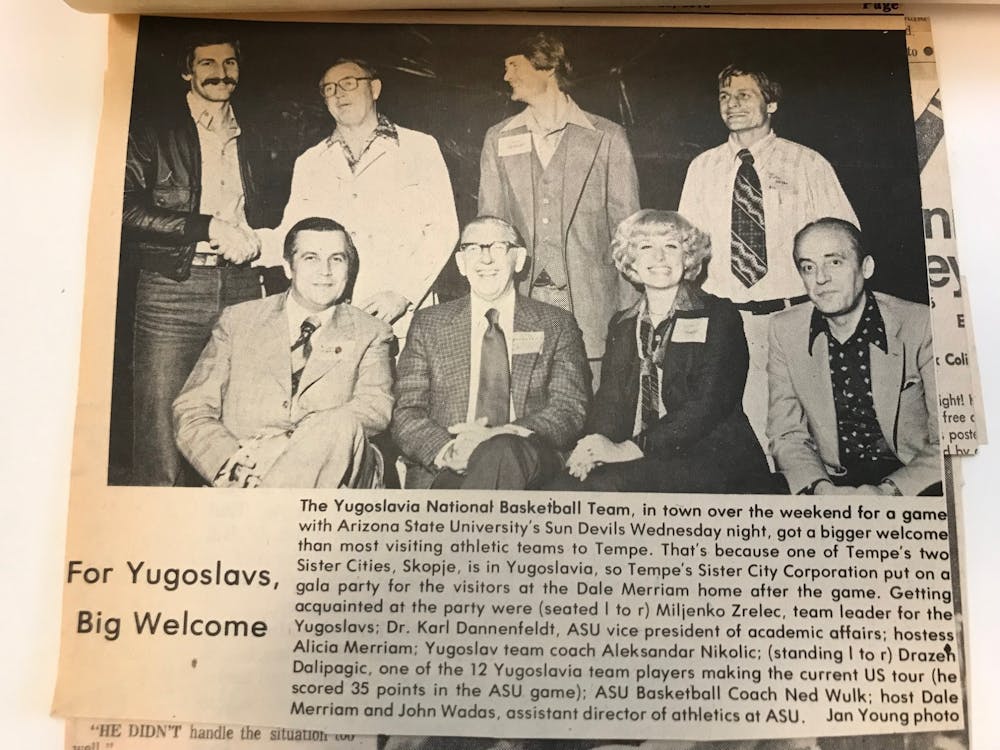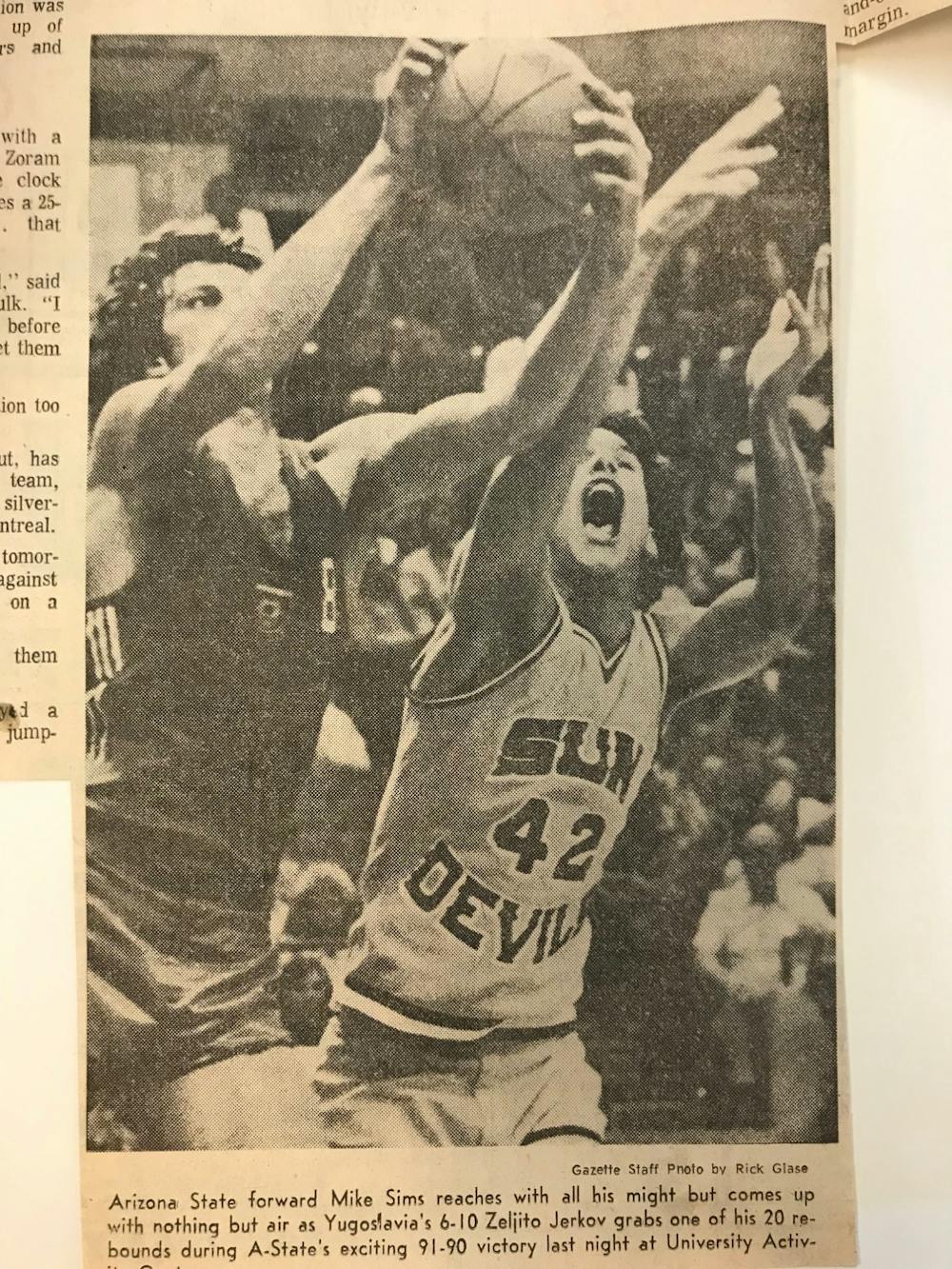With just three seconds on the clock, ASU beat the Olympic silver medalist Yugoslav basketball team on Nov. 25 in a nail-biting game that triumphantly kicked off the 1976 season.
A lineup of freshmen, sophomore and transfer students watched as the six-foot-tall Yugoslav guard Zoran Slavnic ran the clock down and threw a two-handed set shot that missed, giving ASU the game at 91-90.
“You might say I was surprised,” former ASU head men’s basketball coach Ned Wulk told the Phoenix Gazette. He would go on to have the most basketball wins in the University's history. “I’m pleased. Anytime an inexperienced team like us pulls out a win over a veteran team, it’s a good situation.”
According to Victoria Jackson, a sports historian who works with Sun Devil Athletics, ASU’s narrow win against the Olympic team was an offshoot of basketball’s international bend.
“Basketball has been interesting in that it is a sport through which the United States has had to have more global involvement,” Jackson said. “When we're talking about sports and politics, it's like power plays, power dynamics.”
Four years before the Yugoslav match-up, the 1972 Munich Olympics dramatically demonstrated basketball’s relationship with geopolitics when the American men’s team lost by one point to the Soviet Union in a game marred by controversy. This was the first time the United States lost gold in Olympic play in 64 games, the outrage exacerbated by the ongoing Cold War.
“In ‘72, it’s pretty obvious the fix was in to help the Soviets when the refs were either getting paid off or some sort of corruption was happening,” Jackson said. “The narration of the last three seconds of that game really underscores how obvious it was.”
However, at around the same time, Yugoslavia and Arizona enjoyed an unlikely tie: the Tempe Sister Cities program founded by former ASU professor Dick Neuheisel. Tempe was the first American city to partner with a counterpart in a communist country back when Skopje was still a part of Yugoslavia.
It came about because of a daring question Neuheisel posed to then-U.S. Assistant Secretary of State for Educational and Cultural Affairs John Richardson Jr. at a Sister Cities conference in San Diego.
“How come there are no Sister Cities programs between the U.S. and Iron Curtain countries, the communist countries?” Neuheisel had asked. Richardson replied, “No city has had the guts to do that.”
“So that was my mantra,” Neuheisel said. “We (had) the guts to do that, and we did.”
The Tempe City Council approved the relationship in December 1970, and the president of the Skopje City Assembly, Dragoljub Stavrev, sent gifts to Tempe the following year to celebrate the city’s centennial. Stavrev then led a delegation to Tempe and stayed four days.
The visit helped strengthen a special relationship between the two cities, particularly between Stavrev and Neuheisel. According to Neuheisel, now 87 years old, that connection encouraged the Yugoslav national basketball team to play ASU in 1976.
“Oh, I was thrilled,” Neuheisel said about the game. “I don’t remember too many details, but just to have them there, embrace and take pictures. I don’t know where all the pictures are.”
Tempe and Skopje started exchanging high school students, educators and professionals to better befriend each other. The Tempe Sister Cities program expanded, now having 11 partner cities worldwide. ASU also partnered with the Saints Cyril and Methodius University in Skopje.
However, Tempe's relationship with Skopje had one remarkable outcome in 1989: it inspired the future Prime Minister and President of Macedonia, Branko Crvenkovski.
Then, according to Neuheisel, 27-year-old Crvenkovski was an engineering intern with American Cybernetics who spent six weeks in Tempe during a hot summer with the program.
"Before he left, he told me, 'Mr. Neuheisel, I'm going to get involved with politics in Skopje. I'm going to make Skopje and Tempe even better friends, and our two countries, best friends,'" Neuheisel recalled.
Under Crvenkovski's leadership, Macedonia sent troops to help the United States in Afghanistan and Iraq in 2003. A year later, the U.S. granted Macedonia official name recognition, a move that surprised the reluctant European Union at the time.
This cooperation between the two countries testified to the international impact of Tempe and Skopje's friendship. The passing of decades has only strengthened this city-to-city relationship, extending goodwill to ASU as a result, according to Neuheisel.
"More people care about Skopje than ever before in Tempe," Neuheisel said. "In Skopje, everybody knows about Tempe. Young students want to go to America. Young students want to study at ASU."
Edited by Walker Smith, Sadie Buggle and Angelina Steel.
Reach the reporter at mosmonbe@asu.edu and follow @miaosmonbekov on X.
Like The State Press on Facebook and follow @statepress on X.
Mia Osmonbekov is a senior reporter. She previously reported for Arizona Capitol Times, Cronkite News DC, La Voz del Interior and PolitiFact. She is in her 7th semester with The State Press working previously as the opinion editor and assignment editor.






